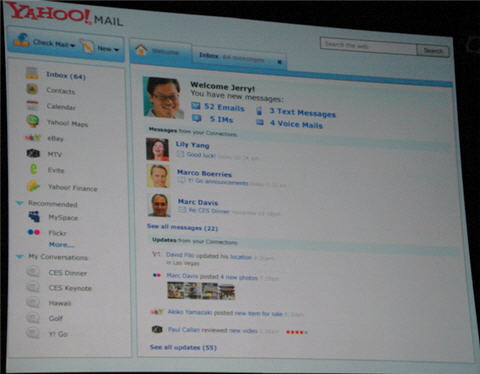All roads lead to the social Web

During a panel discussion at CES, Owen Van Natta, chief revenue officer at Facebook, said, "We believe that social network is not building a new niche or vertical but it will permeate everything on Web and unlock things we don’t do today." All roads lead to the social Web.
Over the last few years, the Web has added a social dimension, but it isn't woven seamlessly into the fabric, permeating the user experience. Now the major aggregators colonizing eyeballs (Yahoo, Google, Microsoft) and the social networking services (Facebook, MySpace, etc.) are going to converge on the same engineered destination--a personal portal that combines social networking, communications, feeds, applications and elements of the semantic Web.
Yahoo offered a glimpse into its notion of a next generation personal portal with Life!

CEO Jerry Yang showed a prototype communication hub that integrates messaging, multiple social networks, tags, and a variety of Web applications and data into a holistic user experience.
He gave an example of planning a dinner for CES, dragging a "conversation" thread into a map and bringing up the profiles of those on the mail along with their preferences (for food in this case). Understanding location and noting preferences among the group, the system suggested suitable restaurants in the area and upon choosing one sends out an invitation to the group.
The other major portals with hundreds of millions of users, Google and Microsoft, are working on similar Web services scenarios that integrate social networking as part of a communications hub, weave together their various applications and manage identity simply and securely.
In addition, Facebook and MySpace will strive to arrive at a similar destination as Yahoo, Google and Microsoft, starting from the social network base. Over time I would expect to see Facebook, for example, to enhance its communications tools, such as email, instant messaging and calendaring, and to offer more Web services for mashing up new kinds of application scenarios.
For all of the players, attracting developers to build on top of their platforms will be a key to building up their user bases. As an example, Yahoo is opening its mobile platform to outside programmers, allowing them to create mobile widgets that can be embedded on Yahoo Go.
Another key to this future of socially-oriented personal portals will be standards that allow users to move across different services and share their data and connections.
The OpenSocial, an effort spearheaded by Google and with most other services signed on except Facebook, provides a set of APIs for allowing applications to access a social network's friends and update feeds. Facebook is making its developer platform available to other social networking sites. Bebo has designed its developer code to be compatible with Facebook's.
Facebook, Google and Yahoo have joined the DataPortability.org Workgroup, which advocates users having their identity, photos, videos and other personal data discoverable and shared between vendors and applications. It may be more symbolic than significant, but the companies recognize that walled gardens are not the future.
What's clear is that within the next two years, we will see the major portals try to figure out how to build platforms that seamlessly mash up services in a social context that is woven into the fabric rather than bolted on as an afterthought.